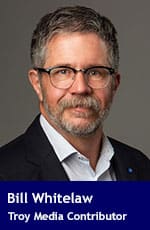Navigating your energy future, Maeve, will be complicated
 Maeve can’t talk yet.
Maeve can’t talk yet.
She coos and trills. She gurgles and squeals. At nearly 10 months, she has ways of letting you know what she wants. Especially when you’re snacking and she’s not.
But she does “talk” – with her eyes. Especially her eyes. They’re expressive eyes. Very expressive.
Those eyes tell you in no uncertain terms what’s on her mind.
Maeve’s my granddaughter. Born just last year, she’s been a more-than-delightful addition to the family. Her mom and dad are over the moon – especially since she’s started sleeping through the night.
As grandparents do, I think a lot about her life and how she will live it. I think about whether she’ll be athletic and outdoorsy. Whether she’ll love animals. Where she’ll go to school and whether she will love to travel. What hobbies she’ll have and how she will chase her dreams. When she’ll marry and perhaps contemplate her own family. All the typical things grandparents ponder as they reflect on their own lives and do their best to be supportive while not interfering (too much).
But when I look at the headlines that dominate and describe the world in which we live today, I get a knot in my stomach. A paralyzing sense of futility threatens to overwhelm me. Frustration washes over me like waves that knock me back down the moment I manage to stand up.
This is especially true of headlines that relate to energy and energy change. In many ways, I don’t envy Maeve and those who will be her family and friends. They will have to live in an energy future that is complex and contested and one in which tough, often ugly, choices will be the order of the day.
Maeve is going to grow up in a world rife with energy tensions, a world in which energy ideologies at the right and left will constrain and stultify the real progress that must be made on climate change and overall environmental degradation. Maeve’s world will be increasingly filled with “energy hate” – yes, it’s a thing – and I lament that her life will be one in which polarization, and not progress, on critical energy issues will be the norm.
Yet there are glimmers of hope, too, for her world is also inhabited by those who would do good, women and men who look around them – as I do – and think, “We can and must do better.”
So, I think about how I will “gramps-splain” things to her. When she’s a preteen. A teenager. A post-secondary student. An engaged-to-be-married young woman. Hopefully, one day, a mom herself.
I’m pretty sure Maeve is already growing up in a “Not-Zero” world. If she could understand the basic concepts of Net Zero, I would have to tell her there is no way that the world will achieve Net Zero status by 2050. Not by a long shot. But I would say to her it’s not so much a particular time-based goal that matters, but it’s in the “try.” And that the “try” must be foundational to her life.
And I would then work like a demon to help her understand what “trying” means to her – how to be the most engaged and active climate and energy-for-good citizen she can be. How she can grow up with a strong and unrelenting sense of “energy civics” via which she advocates and pushes for exponential change that holds the environment, economic, and social welfare in equal balance.
That means if I can do one thing for her, it’s to provide a framework of sorts – a set of tools that will help her understand the forces shaping energy life and how she can exert more than a modicum of control on their direction.
Here’s what I’ve come up with: a three-part framework that will allow us to have lively and engaging conversations wherein I learn from her, and she learns from me. The three elements are not exclusive to each other; in fact, they’re intended to complement and challenge themselves in different contexts and use cases.
Here they are:
- Maeve will need to understand that all energy systems will increasingly require different forms of permission to do what they do. No longer is an often meaningless construct like “social license to operate” of utility. Governments and communities are demanding new and more rigid conduct. NGOs are more than ever important actors. So, too, is civil society. As an energy consumer, Maeve will be able to exert a different form of control in terms of energy actors seeking “permission” to drill a new well or erect a new wind turbine.
- Maeve will also need to keep a close eye on how the oil and gas sector and all other emitting sectors are performing when it comes to quantifiable energy emissions reduction. She’ll need to learn that “data dances to the loudest music it hears” and that we live in a world of different (often opposed) methodologies that produce different results, some legitimate, some in shades of sudsy and foaming green. Whatever her career choice, Maeve will need to become something of a “data quant” in order to understand how to believe what she reads and hears. But at least she’ll know we live in a world seemingly committed to serious emissions reduction, and the gives-and-takes and the pushes-and-pulls of this critical balancing act will be part of her daily life.
- I will be honest with Maeve: I lived, for the most part, an “energy-entitled” life. That’s a life in which I was often only vaguely aware of the intricate dynamics and environmental implications involved from the flick of a light switch to the operation of a fuel pump. I understood (mostly) how the systems work, but my expectations as a consumer are that they stood ready to serve my unfettered consumption. Until later in life, I was never conflicted by my energy choices. Maeve, however, will live a life in which tough choices will be part and parcel of both her personal and professional beings. She’ll have to be conversant on aspects of energy of which I could remain blissfully ignorant. Rising prices on carbon, for example, will be part of her learning next-gen ESL: Energy as a Second Language.
These three pillars of Through Maeve’s Eyes will adapt and adjust according to the situation and context. However, they serve as an initial framework for fostering literacy and awareness and, ultimately, cultivating a robust energy mindset for her.
It’s the least a grandfather should do before the rocking chair of life beckons.
Bill Whitelaw is a director and advisor to many industry boards, including the Canadian Society for Evolving Energy, which he chairs. He speaks and comments frequently on the subjects of social licence, innovation and technology, and energy supply networks.
For interview requests, click here.
The opinions expressed by our columnists and contributors are theirs alone and do not inherently or expressly reflect the views of our publication.
© Troy Media
Troy Media is an editorial content provider to media outlets and its own hosted community news outlets across Canada.

